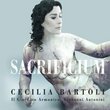| All Artists: Franz Schmidt, Christof Perick, Gwyneth Jones, James King, Horst R. Laubenthal, Hartmut Welker, Kurt Moll, Hans Helm, Kaja Borris Title: Schmidt: Notre Dame [Romantic Opera - Complete Recording] Members Wishing: 0 Total Copies: 0 Label: Capriccio Release Date: 7/23/1992 Genre: Classical Styles: Opera & Classical Vocal, Historical Periods, Modern, 20th, & 21st Century Number of Discs: 2 SwapaCD Credits: 2 |
Search - Franz Schmidt, Christof Perick, Gwyneth Jones :: Schmidt: Notre Dame [Romantic Opera - Complete Recording]
![Schmidt: Notre Dame [Romantic Opera - Complete Recording]](https://nationalbookswap.com/cd//l/64/0164/13240164.jpg) | Franz Schmidt, Christof Perick, Gwyneth Jones Schmidt: Notre Dame [Romantic Opera - Complete Recording] Genre: Classical
|
Larger Image |
CD DetailsSimilar CDs |
CD ReviewsFrom Wagner to Gone With the Wind 12/01/2001 (4 out of 5 stars) "If you've delved as far down Amazon.com's sales ranks as this, presumably you're looking for something new to listen to and are perhaps wondering what Notre Dame is like.Schmidt seems to have been one of a number of highly competent composers working in Vienna in the early 20th century but eclipsed somewhat by Mahler and the second Viennese school. Notre Dame is a compact (in length; the forces required are considerable), well-crafted work. Its sound-world runs from Wagner and Bruckner to Mahler, Strauss and Korngold. Oddly, it also brings Respighi to mind. There is a deliberate contrast between the gorgeously schmaltzy Hungarian gypsy music associated with Esmeralda, and (more Lutheran than Catholic) chorale-like themes and organ for the cathedral and Grégoire.This is, then, a work for those who know their Wagner, Bruckner, Strauss and Mahler by heart, who've "done" Korngold and are looking for something new and big and noisy and exotic: a late-flowering hot-house bloom. It will be of special interest to those looking to trace American film music back to its European origins: there is a definite touch of Gone with the Wind, of Star Wars even, in Notre Dame.The reviewer from Rochester N.Y. is right about the cast and performance: they are very good. The sound is ripe. "German Romanticism" may, though, be misleading: this is as Austro-Hungarian as it comes. Well worth buying." Another voice of German Romanticism John R. Jaeger | Rochester, NY | 07/31/2001 (3 out of 5 stars) "Here is a chance to hear another voice of German Romanticism. Schmidt's opera is lush and tuneful, Esmerelda's theme especially falls gratefully on the ear. Hugo's sprawling novel is reduced to 2 acts and 5 locales. No Charles Laughton, Lon Chaney or Disney gargoyles here. The emphasis is on Esmerelda and the effect she has on the men she encounters. The recording boasts the talents of Gwyneth Jones, James King, Kurt Moll, Horst Laubenthal and Helmut Welker under the direction of Cristof Perick (I mention this only because there are no artists listed for the recording) They do a just representation of the work, although there is nothing to compare it to. One should be grateful that artists of this caliber have made this piece available, and it is certainly worth hearing. My only quibble is that Ms. Jones and Mr. King were captured at the tail end of their careers. While their interpretive talents survive, the voices certainly no longer retain the bloom of youth that is required for these characters. In all other respects this is a recording that repays the listener with some beautiful music and a glimpse of the late romaticism of the turn of the century (the last one, not the current one)."
|

 Track Listings (10) - Disc #1
Track Listings (10) - Disc #1
